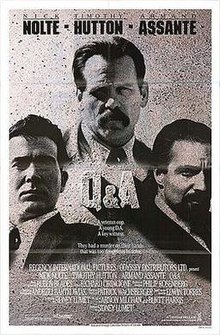
Nicholas King Nolte is an American actor. Known for his leading man roles in both dramas and romances, he has received a Golden Globe Award as well as nominations for three Academy Awards and a Primetime Emmy Award. Nolte first came to prominence for his role in the ABC miniseries Rich Man, Poor Man (1976) for which he received a Primetime Emmy Award for Outstanding Lead Actor in a Limited Series or Movie nomination. He won the Golden Globe Award for Best Actor – Motion Picture Drama for The Prince of Tides (1991). He received three Academy Award nominations for The Prince of Tides (1991), Affliction (1998) and Warrior (2011).
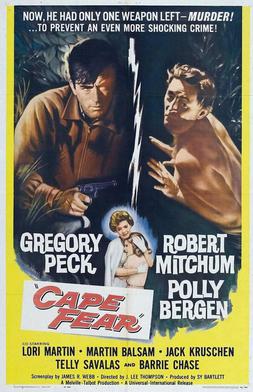
Cape Fear is a 1962 American psychological thriller directed by J. Lee Thompson, from a screenplay by James R. Webb, adapting the 1957 novel The Executioners by John D. MacDonald. It stars Gregory Peck as Sam Bowden, an attorney and family man who is stalked by a violent psychopath and ex-con named Max Cady, who is bent on revenge for Bowden's role in his conviction eight years prior. The film co-stars Polly Bergen and features Lori Martin, Martin Balsam, Jack Kruschen, Telly Savalas, and Barrie Chase in supporting roles.

Sidney Arthur Lumet was an American film director. Lumet started his career in theatre before moving to film, where he gained a reputation for making realistic and gritty New York dramas which focused on the working class, tackled social injustices, and often questioned authority. He received several awards including an Academy Honorary Award and a Golden Globe Award as well as nominations for nine British Academy Film Awards and a Primetime Emmy Award.
Félix Manuel "Bobby" Rodríguez Capó was a Puerto Rican singer and songwriter. He usually combined ballads with classical music and was deeply involved in Puerto Rican folk elements and even Andalusian music, as to produce many memorable Latino pop songs which featured elaborate, dramatic lyrics.
Edwin Torres is a former New York State Supreme Court judge and author of Puerto Rican descent, who wrote the 1975 novel Carlito's Way. His book was the basis for the 1993 movie of the same name, starring Al Pacino, and for the 1979 book After Hours, the sequel to Carlito's Way.

Armand Anthony Assante Jr. is an American actor. He played mobster John Gotti in the 1996 HBO television film Gotti, Odysseus in the 1997 miniseries adaptation of Homer's The Odyssey, Nietzsche in When Nietzsche Wept, and Mickey Spillane's Mike Hammer in 1982's I, the Jury. He has been nominated for two Primetime Emmy Awards, four Golden Globe Awards, and two Screen Actors Guild Awards.
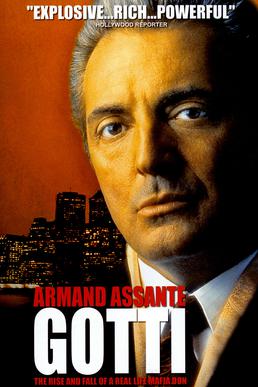
Gotti is a 1996 American crime drama television film directed by Robert Harmon and written by Steve Shagan, based in part on the 1996 non-fiction book Gotti: Rise and Fall by Jerry Capeci and Gene Mustain. The film stars Armand Assante in the title role as infamous Gambino crime family boss John Gotti, along with William Forsythe, and Anthony Quinn. It aired on HBO on August 17, 1996.

Prince of the City is a 1981 American epic neo-noir crime drama film directed by Sidney Lumet. It is based on the life of Robert Leuci, called ‘Daniel Ciello’ in the film, an officer of the New York Police Department who chooses, for idealistic reasons, to expose corruption in the force. The screenplay, written by Lumet and Jay Presson Allen, is based on a 1978 non-fiction book, by former NYPD Deputy Commissioner Robert Daley.

Find Me Guilty is a 2006 American courtroom comedy-drama film co-written and directed by Sidney Lumet. The film is based on the true story of the longest Mafia trial in American history. Much of the courtroom testimony was taken from the original court transcripts. Vin Diesel stars as Jackie DiNorscio, a New Jersey mobster who is on trial with 19 of his colleagues for racketeering. A wrench is thrown into the system when DiNorscio fires his lawyer and decides to represent himself. The film also stars Peter Dinklage, Linus Roache, Alex Rocco, and Ron Silver.

A Stranger Among Us is a 1992 American crime drama film directed by Sidney Lumet and starring Melanie Griffith. It tells the story of an undercover police officer's experiences in a Hasidic community. It was entered into the 1992 Cannes Film Festival. It is often cited as one of Lumet's two failures of the 1990s, the other being Guilty as Sin (1993). Despite the poor reviews suffered by both these films, Lumet received the 1993 D. W. Griffith Award of the Directors Guild of America. The film was also the first credited role for actor James Gandolfini. The shooting of the film was used as an example in Lumet's book Making Movies.
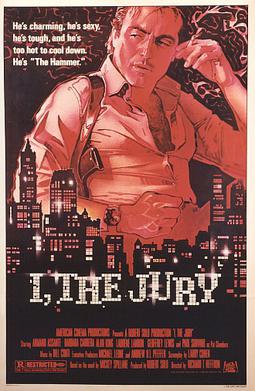
I, the Jury is a 1982 American neo-noir crime thriller film based on the 1947 best-selling detective novel of the same name by Mickey Spillane. The story was previously filmed in 3D in 1953. Larry Cohen wrote the screenplay and was hired to direct, but was replaced when the film's budget was already out of control after one week of shooting. He was replaced at short notice by veteran TV director Richard T. Heffron.
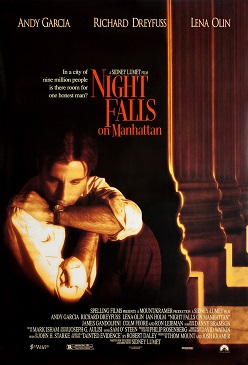
Night Falls on Manhattan is a 1996 American crime drama film written and directed by Sidney Lumet. Based on the novel Tainted Evidence by Robert Daley, the plot centers on a newly elected district attorney played by Andy García, who is eager to stamp out corruption within the New York City Police Department. Ian Holm, James Gandolfini, Lena Olin, Ron Leibman, and Richard Dreyfuss feature in principal supporting roles.

Everybody Wins is a 1990 mystery thriller film directed by Karel Reisz, starring Debra Winger and Nick Nolte. The screenplay was written by Arthur Miller, based on his one-act play Some Kind of Love Story (1984). It is loosely inspired by an actual 1970s murder case in Canaan, Connecticut which was the subject of the television film A Death in Canaan (1978) directed by Tony Richardson. It was also the last film to be directed by Karel Reisz before his death in 2002.
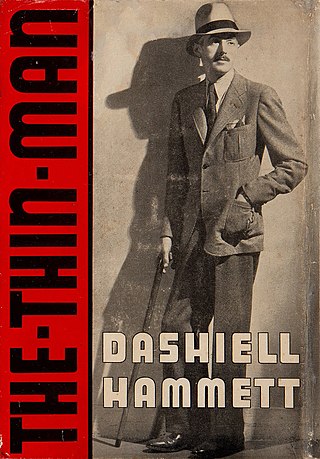
The Thin Man (1934) is a detective novel by Dashiell Hammett, originally published in a condensed version in the December 1933 issue of Redbook. It appeared in book form the following month. A film series followed, featuring the main characters Nick and Nora Charles, and Hammett was hired to provide scripts for the first two.

Step Brothers is a 2008 American comedy film directed by Adam McKay, produced by Jimmy Miller and Judd Apatow, and written by Will Ferrell and McKay from a story by Ferrell, McKay, and John C. Reilly. It follows Brennan (Ferrell) and Dale (Reilly), two grown men who are forced to live together as brothers after their single parents, with whom they still live, marry each other. Richard Jenkins, Mary Steenburgen, Adam Scott, and Kathryn Hahn also star. Ferrell notably sings "Por Ti Volaré" during the film's climatic scene while Reilly plays drums.

Before the Devil Knows You're Dead is a 2007 American crime thriller film directed by Sidney Lumet. The film was written by Kelly Masterson, and stars Philip Seymour Hoffman, Ethan Hawke, Marisa Tomei, and Albert Finney. The title comes from the Irish saying: "May you be in heaven a full half-hour before the devil knows you're dead". The film unfolds in a nonlinear narrative, repeatedly going back and forth in time, with some scenes shown repeatedly from differing points of view. It was the last film directed by Lumet before his death in 2011.

Jaime Luis Sánchez Rodríguez is a Puerto Rican stage, film and television actor, active since the 1950s.

The Chaos Experiment is a 2009 independent suspense thriller directed by Philippe Martinez and starring Val Kilmer, Armand Assante, and Eric Roberts.
Jenny Lumet is an American actress and screenwriter. She is the daughter of director Sidney Lumet and granddaughter of Lena Horne. Lumet is perhaps most known for writing the original screenplay of the 2008 Jonathan Demme film Rachel Getting Married, and her work on the Star Trek franchise.
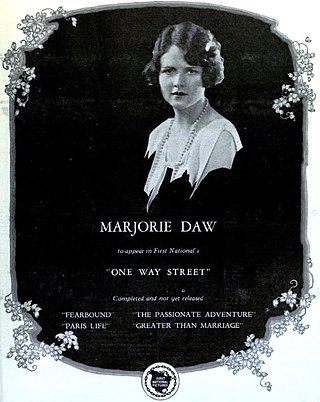
One Way Street is a 1925 American drama film directed by John Francis Dillon and written by Earl Hudson, Mary Alice Scully, and Arthur F. Statter. It is based on the 1924 novel One Way Street by Beale Davis. The film stars Ben Lyon, Anna Q. Nilsson, Marjorie Daw, Dorothy Cumming, Lumsden Hare, and Mona Kingsley. The film was released on April 12, 1925, by First National Pictures.
